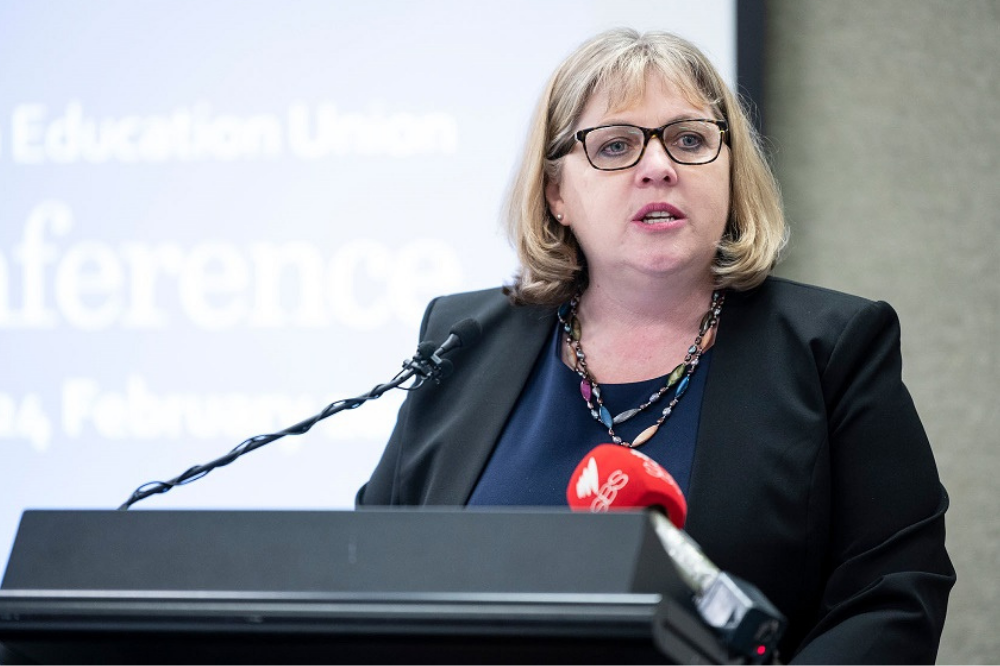
Australia’s peak teacher’s union has launched a national push to get all public schools funded to 100% of the School Resourcing Standard (SRS) within five years as reports highlight an urgent need to increase support for Australia’s largest school sector.
The Australian Education Union’s ‘For Every Child’ campaign, today outside Parliament House in Canberra, aims to secure full funding by 2028 to allow public schools to reduce class sizes, increase the one-on-one support for students and provide more time and classroom assistance for teachers.
“Funding public schools at 100% of the SRS is the only way to ensure every child gets every opportunity to succeed and we have the teachers we need for the future,” AEU federal president Correna Haythorpe said.
“The needs of our children are growing but the funding from governments hasn’t kept up. Principal and teacher workloads are unsustainable, and more and more teachers are leaving the profession early.”
A comprehensive plan, ‘Investing in Australia’s Future’ is also being released today showing the urgent need for additional funding and the areas it should be invested in to lift outcomes and close achievement gaps between students from different backgrounds.
The plan includes results from a national survey of 7,808 teachers, principals and support staff that reveals the extent of staffing shortages across Australia’s school system and rising workloads that are taking a serious toll on teachers’ physical and mental health.
In 2022, a staggering 90% of principals reported teacher shortages – almost double the number that experienced them three years ago. Research shows these shortages are largely being driven by rising workloads, burnout, and wellbeing related issues.
Two-thirds of teachers surveyed say their workload has increased in the last year and less than one in five are committed to teach until retirement. Australia’s ageing teacher workforce is also of concern, with data from 2020 indicating more than a third (38%) of all registered teachers are aged 50 years and over.
The union also highlighted the need for greater wellbeing support in schools over student and teacher wellbeing, with the survey showing over 70% of principals reporting a decline in student wellbeing in the last year.
Meanwhile, principals are also struggling to meet the basic resourcing needs of their schools. Almost 90% of principals report taking funding from other areas of their school budget, such as maintenance, due to a lack of funding for students with disability, whose numbers have increased by 29% since 2015.
When asked what they believe would help them improve student outcomes, more than 90% of teachers surveyed cited additional support for students with a disability or behavioural issues, more time for lesson planning, more classroom assistance and smaller class sizes.
The principals who were surveyed said children who have fallen behind in literacy or numeracy and those with a disability or learning difficulties are the ones who would benefit the most from full funding of public schools.
In its meetings with federal politicians in Canberra today, the AEU will seek clarity regarding when schools will be receiving the funding that the Federal Government has committed to.
“We welcome the commitment of the Albanese Government to full funding of public schools but there needs to be a clear timetable established to achieve that by 2028,” Haythorpe said. “We also need a permanent Commonwealth capital works fund for public schools to match the one that is in place for private schools.”
Independent schools back calls for better funding
With the Review to Inform a Better and Fairer Education System closing tomorrow, other school sectors are joining the union’s calls for all schools to be funded at 100% of their SRS.
“All school sectors face common challenges, including supporting wellbeing, addressing workforce issues, and improving outcomes for disadvantaged and at-risk students,” Independent Schools Australia (ISA) Chief Executive Officer, Graham Catt, said.
“Working collaboratively across school sectors and governments is the only way we will find solutions to the challenges we collectively face and improve our education system overall.”
Catt said the Independent sector’s 680,000 students, their families, and 115,000 educators want schools “to be focused on ensuring that all Australian families have genuine choice and that all Australian children receive the best education that our nation can deliver.”
"Independent schools not only provide choice and quality education to a wide range of families and communities, but they are uniquely positioned to contribute valuable insights and evidence."


